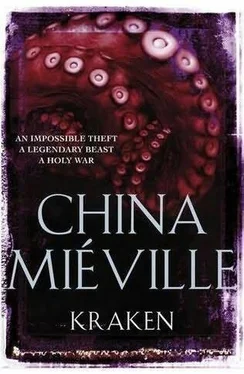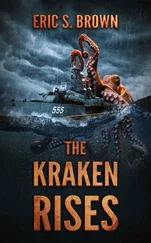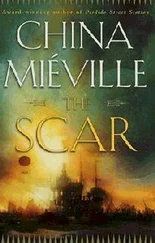
© 2010
To Mark Bould
Comrade-in-tentacles
For all their help with this book I’m extremely grateful to Mark Bould, Mic Cheetham, Julie Crisp, Melisande Echanique, Penelope Haynes, Chloe Healy, Kaitlin Heller, Deanna Hoak, Simon Kavanagh, Peter Lavery, Jemima Miéville, David Moensch, Sandy Rankin, Max Schaefer, Jesse Soodalter, and to my editors Chris Schluep and Jeremy Trevathan. My sincere thanks to all at Del Rey and Macmillan.
The Natural History Museum and Darwin Centre are, of course, real places-the latter containing a real Architeuthis-but the questionable versions depicted here are entirely my responsibility. For their extraordinary hospitality and behind-the-scenes access, I am enormously grateful to those who work in the real institutions, particularly Patrick Campbell, Oliver Crimmen, Mandy Holloway, Karen James, and John Lambshead.
The poem in chapter 19, “The Kraken Wakes,” is copyright Hugh Cook, and I am very grateful to his family for permission to reproduce it. Among the countless writers, musicians, artists, and researchers to whom I’m indebted, those I’m particularly aware of and grateful to with regard to this book include Hugh Cook, Burial, Hugh Harman and Rudy Ising, William Hope Hodgson, Pop Will Eat Itself, Tsunemi Kubodera and Kyoichi Mori, Jules Verne, H. G. Wells, and Japetus Steenstrup.
“The green waves break from my sides
As I roll up, forced by my season”
– HUGH COOK, “The Kraken Wakes”
The sea is full of saints. You know that? You know that: you’re a big boy.
The sea’s full of saints and it’s been full of saints for years. Since longer than anything. Saints were there before there were even gods. They were waiting for them, and they’re still there now.
Saints eat fish and shellfish. Some of them catch jelly fish and some of them eat rubbish. Some saints eat anything they can find. They hide under rocks; they turn themselves inside out; they spit up spirals. There’s nothing saints don’t do.
Make this shape with your hands. Like that. Move your fingers. There, you made a saint. Look out, here comes another one! Now they’re fighting! Yours won.
There aren’t any big corkscrew saints anymore, but there are still ones like sacks and ones like coils, and ones like robes with flapping sleeves. What’s your favourite saint? I’ll tell you mine. But wait a minute, first, do you know what it is makes them all saints? They’re all a holy family, they’re all cousins. Of each other, and of… you know what else they’re cousins of?
That’s right. Of gods.
Alright now. Who was it made you? You know what to say.
Who made you?
AN EVERYDAY DOOMSAYER IN SANDWICH-BOARD ABRUPTLY walked away from what over the last several days had been his pitch, by the gates of a museum. The sign on his front was an old-school prophecy of the end: the one bobbing on his back read FORGET IT.
INSIDE, A MAN WALKED THROUGH THE BIG HALL, PAST A DOUBLE stair and a giant skeleton, his steps loud on the marble. Stone animals watched him. “Right then,” he kept saying.
His name was Billy Harrow. He glanced at the great fabricated bones and nodded. It looked as if he was saying hello. It was a little after eleven on a morning in October. The room was filling up. A group waited for him by the entrance desk, eyeing each other with polite shyness.
There were two men in their twenties with geek-chic haircuts. A woman and man barely out of teens teased each other. She was obviously indulging him with this visit. There was an older couple, and a father in his thirties holding his young son. “Look, that’s a monkey,” he said. He pointed at animals carved in vines on the museum pillars. “And you see that lizard?”
The boy peeped. He looked at the bone apatosaurus that Billy had seemed to greet. Or maybe, Billy thought, he was looking at the glyptodon beyond it. All the children had a favourite inhabitant of the Natural History Museum’s first hall, and the glyptodon, that half-globe armadillo giant, had been Billy’s.
Billy smiled at the woman who dispensed tickets, and the guard behind her. “This them?” he said. “Right then, everyone. Shall we do this thing?”
HE CLEANED HIS GLASSES AND BLINKED WHILE HE WAS DOING IT, replicating a look and motion an ex had once told him was adorable. He was a little shy of thirty and looked younger: he had freckles, and not enough stubble to justify “Bill.” As he got older, Billy suspected, he would, DiCaprio-like, simply become like an increasingly wizened child.
Billy’s black hair was tousled in halfheartedly fashionable style. He wore a not-too-hopeless top, cheap jeans. When he had first started at the centre, he had liked to think that he was unexpectedly cool-looking for such a job. Now he knew that he surprised no one, that no one expected scientists to look like scientists anymore.
“So you’re all here for the tour of the Darwin Centre,” he said. He was acting as if he thought they were present to investigate a whole research site, to look at the laboratories and offices, the filing, the cabinets of paperwork. Rather than to see one and only the one thing within the building.
“I’m Billy,” he said. “I’m a curator. What that means is I do a lot of the cataloguing and preserving, stuff like that. I’ve been here awhile. When I first came here I wanted to specialise in marine molluscs-know what a mollusc is?” he asked the boy, who nodded and hid. “Snails, that’s right.” Mollusca had been the subject of his master’s thesis.
“Alright, folks.” He put his glasses on. “Follow me. This is a working environment, so please keep the noise down, and I beg you not to touch anything. We’ve got caustics, toxins, all manner of horrible stuff all over the place.”
One of the young men started to say, “When do we see-?” Billy raised his hand.
“Can I just…?” he said. “Let me explain about what’ll happen when we’re in there.” Billy had evolved his own pointless idio-superstitions, according to one of which it was bad luck for anyone to speak the name of what they were all there for, before they reached it.
“I’m going to show you a bunch of the places we work,” he said lamely. “Any questions, you can ask me at the end: we’re a little bit time constrained. Let’s get the tour done first.”
No curator or researcher was obliged to perform this guide-work. But many did. Billy no longer grumbled when it was his turn.
They went out and through the garden, approaching the Darwin with a building site on one side and the brick filigrees of the Natural History Museum on the other.
“No photos please,” Billy said. He did not care if they obeyed: his obligation was to repeat the rule. “This building here opened in 2002,” he said. “And you can see we’re expanding. We’ll have a new building in 2008. We’ve got seven floors of wet specimens in the Darwin Centre. That means stuff in Formalin.”
Everyday hallways led to a stench. “Jesus,” someone muttered.
“Indeed,” said Billy. “This is called the dermestarium.” Through interior windows there were steel containers like little coffins. “This is where we clean up skeletons. Get rid of all the gunk on them. Dermestes maculatus.”
A computer screen by the boxes was showing some disgusting salty-looking fish being eaten by insect swarms. “Eeurgh,” someone said.
Читать дальше












